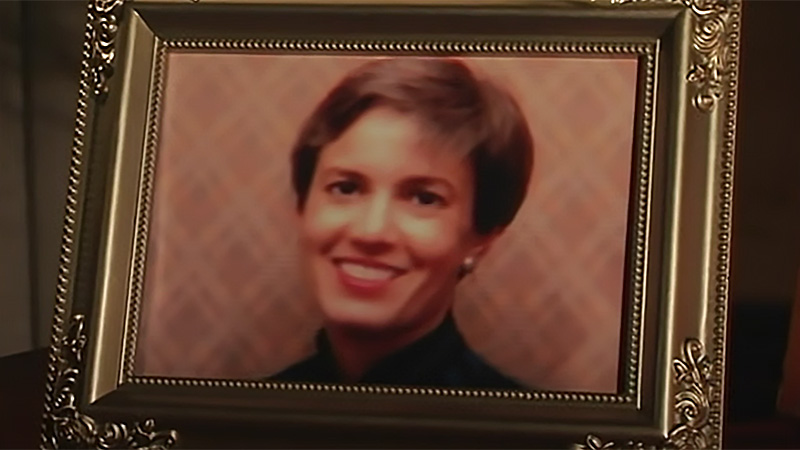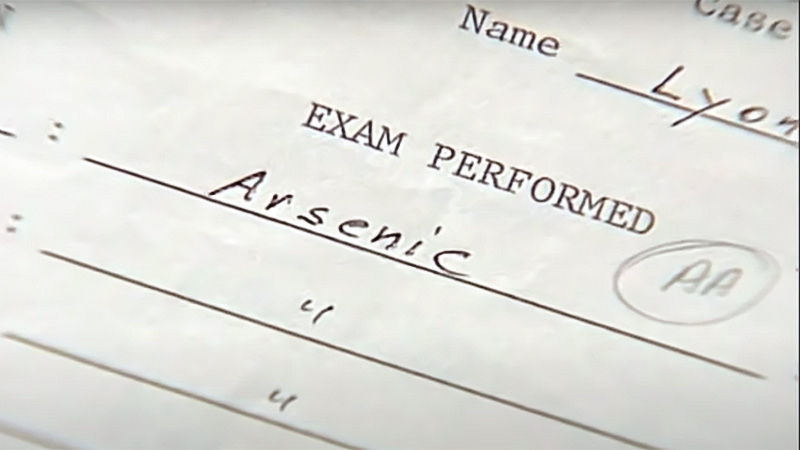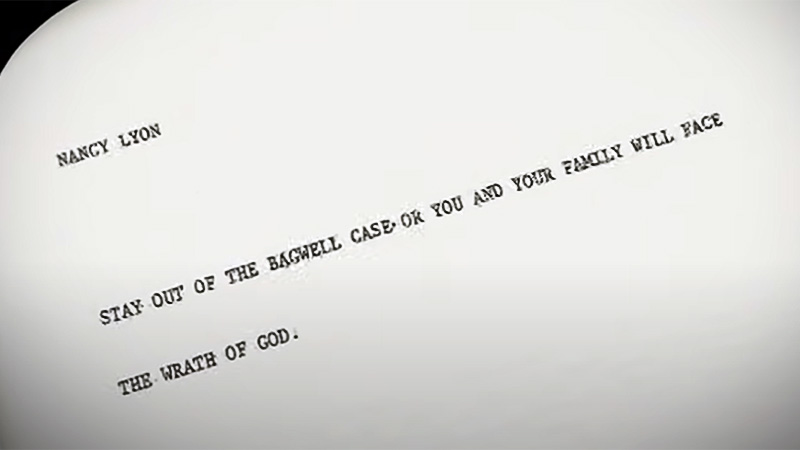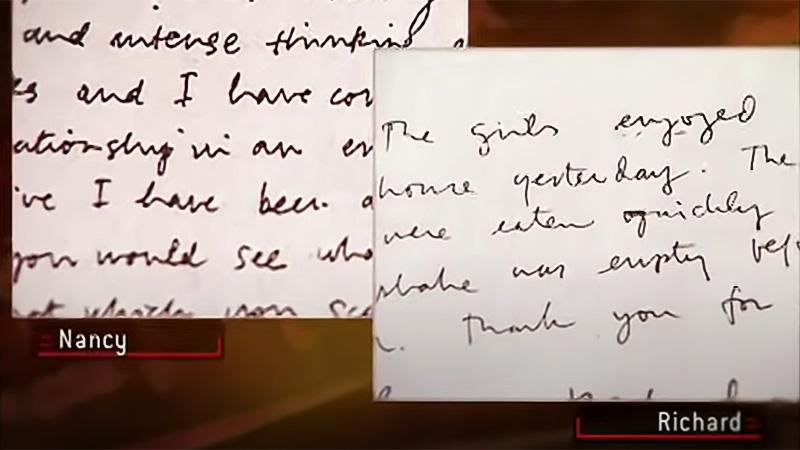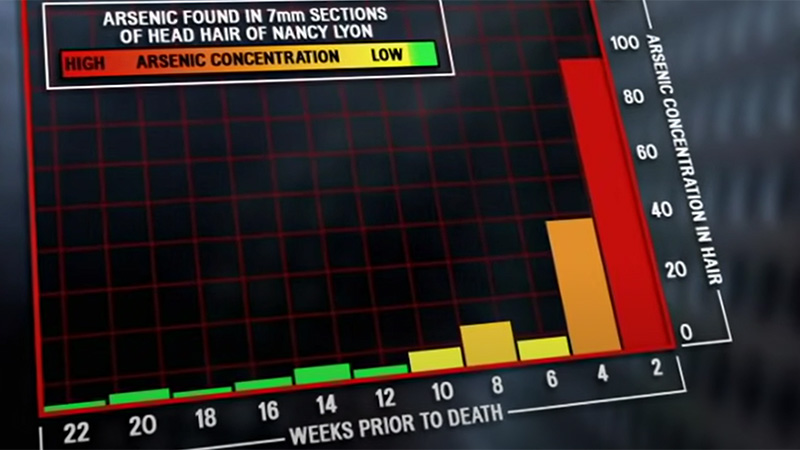Writer's Block
Nancy Dillard Lyon murder by arsenic poisoning by husband Richard Lyon
Nancy Dillard Lyon was a Harvard-educated architect. After marital strife with husband Richard, the couple reconciled, but soon after Nancy became consistently and increasingly ill.
Original air date: October 26, 2005
Posted: June 6, 2022
By: Robert S.
Season 10, Episode 21
Nancy Dillard was born to an affluent Texas family in 1953. She attended Harvard University before joining the architectural firm of Trammell Crow. Nancy's tenacity and talent were evident when she became the youngest person in the company's illustrious history to make partner. But Nancy Dillard didn't come away from Harvard with just a degree in architecture. It was there in Cambridge that she met her future husband, Richard Lyon.
Nancy became Nancy Dillard Lyon, and the couple moved to the prestigious neighborhood of University Park on the outskirts of Dallas. Richard and Nancy had two daughters. A combination of an aggressive work schedule and the duties of raising young children took its toll on Nancy. Things then got worse when she found out that her husband Richard was having an affair in the fall of 1989.
In early 1990, Richard moved out of the house and continued his extramarital relationship. Nancy sought counseling and patiently hoped to reconcile the relationship. But in September of 1990, Richard filed for divorce. Despite this, the couple decided to make another go of their marriage, and Richard moved back into their duplex. Then a series of strange illnesses began to overwhelm Nancy Dillard Lyon.
First, an odd-tasting drink at the movie theater caused Nancy to become violently ill. Then, Nancy experienced another bout of nausea and vomiting after consuming wine that was left on her doorstep, seemingly as a gift. Finally in January, Nancy again became violently ill and was taken to the emergency room. Despite doctors' best efforts, Nancy's organs began to fail. She was stabilized and put on life support, but within a week, Nancy Dillard Lyon died.
A toxicology report soon identified arsenic as the cause of Nancy's death, but it wasn't believed she would've used such an agonizing means to commit suicide. Multiple scenarios soon emerged. Nancy was soon to be a witness in her former boss' embezzlement trial. And disturbing writings in Nancy's diary pointed to a suspected history of sexual abuse by her older brother. But would the murderer be found among these suspects or closer to home?

The Facts
Case Type: Crime
Crime
- Murder
Date & Location
- September, 1990 through January 14, 1991
- University Park, Texas
Victim
- Nancy Dillard Lyon (Age: 37)
Perpetrator
- Richard Lyon (Age: 33)
Weapon
- Poison: Arsenic
Watch Forensic Files: Season 10, Episode 21
Writer's Block

The Evidence
Forensic Evidence
- Handwriting
- Purchase record/receipt
- Report: Autopsy
- Report: Toxicology
- Written narrative: Victim
Forensic Tools/Techniques
- Gamma-ray spectrophotometry

Usual Suspects
No Evil Geniuses Here ?
- None occurred in this episode
Cringeworthy Crime Jargon ?
- None uttered in this episode
File This Under... ?
- Keep it in the family

The Experts
Forensic Experts
- None featured in this episode
Quotable Quotes
- "I was married to a nurse. She had taken care of Nancy Dillard in the trauma center. She said, 'She looked like she’d been poisoned to me.'" - Michael Brock: (Ret.) Homicide Investigator
- "Well, all the specimen tests showed significant amounts and levels of arsenic. And what that shows is that the poison was absorbed through the GI tract – that it was distributed through the blood." - Jeffrey Barnard, M.D.: Medical Examiner
- "In the event that this case becomes a murder charge, this will be an honest to goodness Perry Mason-style whodunit." - Dan Guthrie: Richard Lyon’s Attorney
- "It never crossed his mind he was gonna be caught. He thought he had it aced, and he certainly didn’t think it’d be his own handwriting." - Jerri Sims: Prosecutor
- "There was no reason in the world to have a post office box set up in Preston Center for him to get this arsenic. If everything is completely legitimate, why aren’t you having it delivered at home or where you work? That’s because it’s nefarious reasons of having it delivered to a post office box. " - Michael Brock: (Ret.) Homicide Investigator
- "And it’s kind of outside the realm of most people’s, I mean, reality that someone would poison you, and I don’t think she wanted to believe it. And I think that she was embarrassed or ashamed to say anything about it. " - Jerri Sims: Prosecutor
Book About This Case
Find a typo or issue with the details of this case? Leave a comment below, or contact us!

